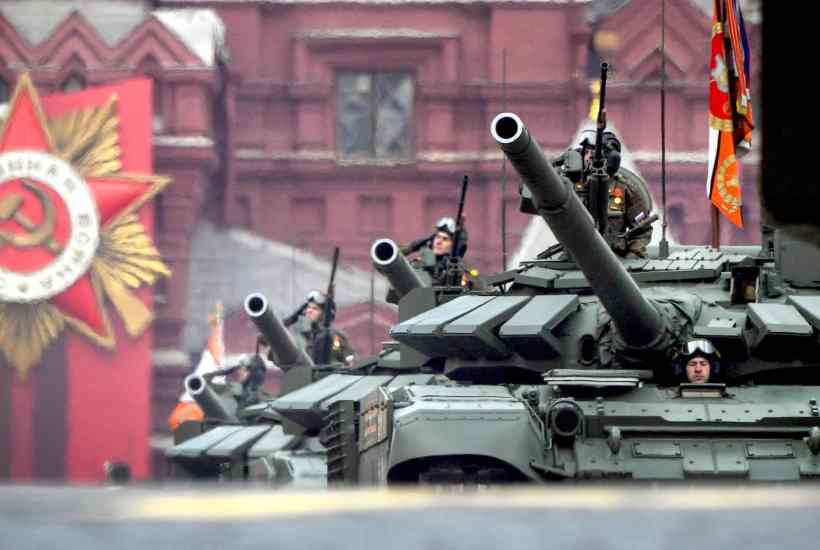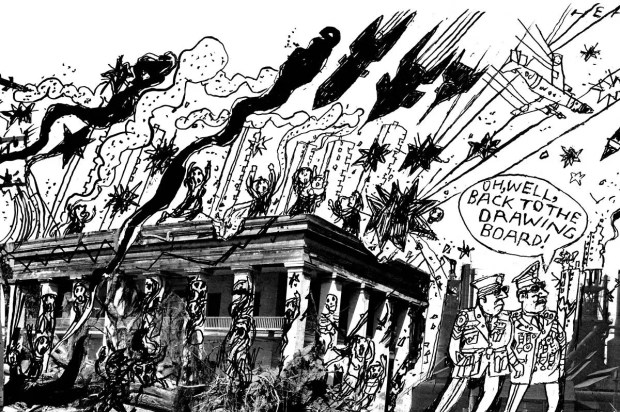This idolisation of the Soviet military is Russia’s modern tragedy. Not least because it is crucial to Putin’s way of controlling the country. Russians are prodded to believe in a golden thread linking the achievements of an unsullied Red Army with what their soldiers are perpetrating in Ukraine today.
This is why it was entirely to be expected that at today’s Victory Day parade Putin again couched his so-called ‘special military operation’ in terms of a fight against ‘Nazis’. It’s also why the Russian foreign minister, Sergei Lavrov, has compared Ukraine’s Jewish president to Hitler. And why the hi-tech killing equipment trundling across Red Square this morning was led by an antique T-34 tank from the ‘Great Patriotic War’, as it is known in Russia.
The cult of that war, which Putin has assiduously fed to his people, serves multiple purposes. The most important is that it is perhaps the only idea that the Kremlin can draw upon to unite a colossal nation experiencing grossly differing living standards, rampant corruption, and thorough-going disenchantment with politics of all stripes. After all, communism and a half-hearted stab at democracy both turned out to be abject flops. By contrast, knowing that the USSR had a big hand in saving the world from fascism is one thing people aren’t entirely cynical about.
A focus on the past quite simply distracts from the unlovely present. Outside the more or less flourishing centres of big cities, countless Russians lead fraught and cheerless lives. It also helps fuel a paranoid narrative of victimhood, in which Russia is perpetually beset by murderous and rapacious external forces, filled with irrational hatred. The fear of enemies at the gate helps divert attention from the theft and mismanagement at home.
This theme was inevitably reflected in Putin’s speech at today’s parade: Russia had hoped for dialogue, he said, but Nato had other plans. ‘They were planning an assault on our historic lands, including Crimea. Nato has begun the active military absorption of territories bordering ours. That is absolutely unacceptable to us.’ Russia was therefore left with no other rightful choice, he declared.
Putin has cultivated this war fetish by cementing Nazi Germany’s defeat into the foundations of Russia’s national story. Post-soviet school textbooks that in the 1990s called into question the behaviour of Stalin and the Red Army have been ‘updated’ to whitewash away the needless deaths of millions due to incompetent leadership. Citizens are encouraged to parade portraits of Soviet war dead – the Immortal Regiment, as the event is called. Crude bumper stickers on cars in Moscow show a male figure mounting another: they read ‘Berlin – We Can Do It To You Again!’
It is also a quasi-religious cult, as with much of Putin’s late-career thrust to messianism. Orthodox priests routinely sprinkle ‘holy water’ over ballistic missiles and heavy weaponry, while in a Moscow theme park for Russia’s armed forces a supremely ugly cathedral has been erected as some sort of martial temple. Victory Day ‘is the holiest holiday in our country. It has been and will remain the holiest holiday for all Russians,’ said Putin’s spokesman, (with no regard for Orthodox Christmas or Easter).
In a final post-invasion flourish, casting doubt on Russian military achievements is now classed as spreading ‘fake news’ and has become a jailable offence. Last month, Irina Gen, a school teacher in the town of Penza, was reported by her own pupils for saying that Russia was a rogue totalitarian state. She now faces up to a decade in prison. As does a young musician and artist in St Petersburg, Sasha Skolichenko, who attempted to protest by switching price tags in a supermarket with news about the invasion.
The most pernicious effect of the glorification of war is that it makes predatory campaigns more easily replicable. A people that have been incessantly told that the business of killing is honourable, even a holy duty, are being carefully marinated in blood.
And this may be the best argument against those who suggest that ‘we’ should sue for peace (irrespective of what Ukrainians themselves might want). It would simply kick the army mess tin down the road. How could one reach mutually acceptable terms with a serial liar who promotes a fanatical death cult?
Watching today’s ceremony, I was reminded of an interview I conducted in 1995 with a Red Army veteran in Grozny, Chechnya, an elderly man in an old suit jacket. Two campaign medals were pinned to his broad lapels and the jacket cloth was discoloured by plaster and brick dust. He was standing outside what had been a prestigious 19th-century apartment building, now mostly destroyed by rockets or shellfire.
’Why have they done this to us? I am a Red Army veteran. I fought in Berlin’. He was shaking with anger as I recorded the interview. I had nothing to say in response. Like many of the victims of the first and second Chechen wars, the man was an ethnic Russian. Like his Chechen compatriots, he was experiencing the kind of brutal military tactics that had changed little since the days of his active service.
‘What will you do with this interview? Who will see it?’ he asked. I explained that we were filming for a news agency that distributed video to international broadcasters. ‘Maybe if enough people around the world see what is happening here, such things might come to an end?’
This was my question, not his. I asked it only to try to fill his long silence and perhaps prolong the interview. But the old man did not respond. There was nothing else to say. We drove off and left him outside that shattered, once-beautiful building. The next time I returned to Grozny, it had been obliterated. The road it once stood on, the Avenue of Victory, has since been renamed: Vladimir Putin Avenue.
Got something to add? Join the discussion and comment below.
Get 10 issues for just $10
Subscribe to The Spectator Australia today for the next 10 magazine issues, plus full online access, for just $10.




















Comments
Don't miss out
Join the conversation with other Spectator Australia readers. Subscribe to leave a comment.
SUBSCRIBEAlready a subscriber? Log in